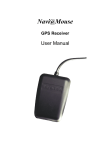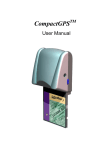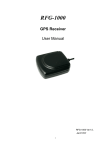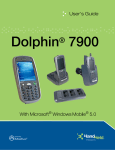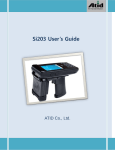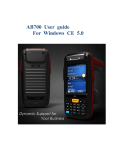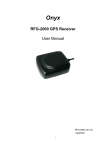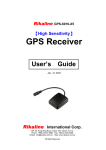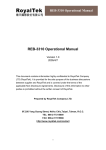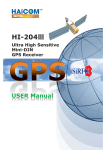Download RoyalTek RGM-2000 User manual
Transcript
Sapphire GPS Receiver User Manual RGM-2000 Contents WHAT IS SAPPHIRE ?........................................................................................................... 3 WHAT IS INSIDE ? ................................................................................................................. 3 WHAT IS GPS ? ....................................................................................................................... 3 WHAT HAVE INSIDE THE PACKAGE?............................................................................. 4 HOW TO INSTALL & OPERATE SAPPHIRE ( RS-232 ) ? .............................................. 5 HOW TO INSTALL & OPERATE SAPPHIRE ( USB ) FOR WINDOWS 98?.............. 7 HOW TO INSTALL & OPERATE SAPPHIRE ( USB ) FOR WINDOWS ME? ......... 13 HOW TO INSTALL & OPERATE SAPPHIRE ( USB ) FOR WINDOWS 2000?........ 17 HOW TO INSTALL & OPERATE SAPPHIRE ( USB ) FOR WINDOWS XP?........... 26 HOW TO TEST YOUR SAPPHIRE .................................................................................... 32 HOW TO SYNCHRONIZE YOUR PDA ............................................................................ 36 PHYSICAL CHARACTERISTICS...................................................................................... 37 SOFTWARE DATA................................................................................................................ 39 TROUBLESHOOTING......................................................................................................... 43 APPENDIX : CONNECTOR INTERFACE........................................................................ 44 LIMITED WARRANTY........................................................................................................ 45 What Is Sapphire ? Congratulation on your purchase of Sapphire, offering diverse GPS (Global Positioning System) applications. Sapphire represents the latest ingenious GPS technology from the leading GPS receiver manufacturer. Connecting to the notebook PC implementing a map or navigation software, Sapphire helps you locate one or multiple objects, conduct personal & vehicle navigation, and/or apply for geographical surveys. What Is Inside ? Before you start up, make sure that your package includes the following items. If any items are missing or damaged, contact RoyalTek immediately. Please refer to the contact information on the last page of this manual. ◆GPS Receiver ◆ Cable(RS-232 or USB) ◆CD Disc What Is GPS ? In 1974 the USA Department of Defense set about developing a Global Positioning System (GPS), a constellation of 24 satellites that Orbits 12,000 miles above the Earth. Using triangulation of signals from four of the satellites, a receiving unit on earth can pinpoint its current location to within a few meters. A GPS device receive the data, then convert the longitude, latitude, and altitude (LLA) data into a location point. Position and navigation information is vital to a wide range of professional and recreational activities covering surveying, search and rescue, tracking, hiking, navigating, and so forth. What Have Inside the Package? Before you start up, make sure your package includes the following items. If any item is missing or damaged, contact your dealer immediately. Please refer to the contact information on the last page of this manual. ◆ GPS Receiver ◆ Application CD ◆ Cable for RS232 or USB (depending on what you buy) RGM-2000M PDA cable selection: HP iPaq series Casio series HP Jornada series Fujitsu-Siemens LOOX Series O2 XDA Series *Other various PDA cables : Please refer to our web site. RS-232/Ps2 USB Car cigarette adaptor 12V How to Install & Operate Sapphire ( RS-232 ) ? Getting Started Step 1:Plug RS-232 to COM port of your Notebook PC or Handheld PC. Step 2:Plug PS2 connector in the PS2 mouse outlet of your Notebook PC or Handheld PC. RS-232 PS2 Step 3:Place your Sapphire on the outside roof of your vehicle with magnetic base. Step 4:Power on your Notebook PC or Handheld PC. If you have ordered a cigarette adaptor, please plug the cigarette adaptor into the cigarette outlet of the car. Step 5:Choose the correct COM port for running the map or navigation software. Step 6:Run the Sapphire test program. Please refer to “How to test your Sapphire”. Notice: (1) Make sure the power is off before started. (2) For safety reason, please do not install Sapphire while driving. (3) To receive NMEA0183 navigational data, please use the Hyper Terminal program of Windows95/98/ME/2000. Please setup the COM port connected with Sapphire to: Baud rate Data bit Parity Stop bit Flow control : 4800 :8 : None :1 : None. (4) The formats of NMEA messages are illustrated on Software Data section. (5) To prevent from the poor contact, the 4-pin mini din connector was designed as good fitting. It is strongly recommend that user doesn’t plug and unplug this connector frequently. How to Install & Operate Sapphire ( USB ) for Windows 98 ? Getting Started Step 1:Plug USB connector to USB port of your Notebook PC or Handheld PC. Step 2: After plug in the Sapphire, it will automatically detect the hardware and show up pop-up dialog as follows. Click “Next>” button. Assert the “Search for the best driver for your device”. Click “Next>” button. Please assert the “Specify a location” and select the correct directory of the driver, ”\USB_DRIVER” in CD-Disc. Click the “Next>” button. It will find the driver from the CD-Disc automatically. Click “Next>” button. The USB Serial converter driver is installed now. You can check the COM port number of Sapphire from the System properties now. The default COM port is COM3 in this example. Step 3:Place your Sapphire on the outside roof of your vehicle with magnetic base. Step 4:Power on your Notebook PC or Handheld PC. Step 5:Choose the correct COM port for running the map or navigation software. Step 6:Run the Sapphire test program. Please refer to “How to test your Sapphire”. Notice: (1) Make sure the power is off before started. (2) For safety reason, please do not install Sapphire while driving. (3) To receive NMEA0183 navigational data, please use the Hyper Terminal program of Windows 95/98. Please setup the COM port connected with Sapphire to: Baud rate : 4800 Data bit :8 Parity : None Stop bit :1 Flow control : None. (4) NMEA 0183 data formats are illustrated on Software Data section. (5) To prevent the poor contact, the 4-pin mini din connector was designed as good fitting. We strongly recommend user that do not plug and draw this connector frequently. How to Install & Operate Sapphire ( USB ) for Windows Me ? Step 1:Plug USB connector (➀) to USB port to your Notebook PC or Handheld PC. Step 2:After plug in the Sapphire, it will detect the hardware automatically. Click the “Next>” button. Please assert the “Specify a location” and select the correct directory of the driver in CD-Disc, ”\USB_DRIVER”. Click the “Next>” button. Windows Me will search and find the USB serial driver. Click “Next>” button. The USB Serial converter driver is installed now. You can check the COM port number of Sapphire from the System properties now. Step 3:Place your Sapphire on the outside roof of your vehicle with magnetic base. Step 4:Power on your Notebook PC or Handheld PC. Step 5:Choose the correct COM port for running the map or navigation software. Step 6:Run the Sapphire test program. Please refer to “How to test your Sapphire”. Notice: (1) Make sure the power is off before started. (2) For safety reason, please do not install Sapphire while driving. (3) To receive NMEA0183 navigational data, please use the Hyper Terminal program of Windows Me. Please setup the COM port connected with Sapphire to: Baud rate : 4800 Data bit :8 Parity : None Stop bit :1 Flow control : None. (4) NMEA 0183 data formats are illustrated on Software Data section. (5) To prevent the poor contact, the 4-pin mini din connector was designed as good fitting. We strongly recommend user that do not plug and draw this connector frequently. How to Install & Operate Sapphire ( USB ) for Windows 2000 ? Step 1:Plug USB connector (➀) to USB port to your Notebook PC or Handheld PC. Step 2:After plug in the Sapphire, it will detect the hardware automatically. Click the “Next>” button. Please select “Search for a suitable driver for my device”. Click “Next>” button. Please select the “Specify a location”. Click “Next>” button. Please browse the CD-Disc and select the directory, “\USB_DRIVER”. Click “OK” button. Windows 2000 will find the USB Serial converter device. Click the “Next>” button. The USB Serial driver is installed in Windows 2000 now. It will setup the USB Serial port driver for Sapphire. Please click “Next>” button. Please select the “Search for a suitable driver for my device”. Click “Next>” button. Please select the “Specify a location”. Click “Next>” button. Please select the directory of the Sapphire, “\USB_DRIVER”. Click “OK”. It will find the driver and install it. The USB Serial Port driver is installed in Windows 2000 now. You can check the Com port number of the Sapphire from Device Manager. It is COM3 in this example. Step 3:Place your Sapphire on the outside roof of your vehicle with magnetic base. Step 4:Power on your Notebook PC or Handheld PC. Step 5:Choose the correct COM port for running the map or navigation software. Step 6:Run the Sapphire test program. Please refer to “How to test your Sapphire”. Notice: (1) Make sure the power is off before started. (2) For safety reason, please do not install Sapphire while driving. (3) To receive NMEA0183 navigational data, please use the Hyper Terminal program of Windows 2000. Please setup the COM port connected with Sapphire to: Baud rate : 4800 Data bit :8 Parity : None Stop bit :1 Flow control : None. (4) NMEA 0183 data formats are illustrated on Software Data section. (5) To prevent the poor contact, the 4-pin mini din connector was designed as good fitting. We strongly recommend user that do not plug and draw this connector frequently. How to Install & Operate Sapphire ( USB ) for Windows XP ? Step 1:Plug USB connector (➀) to USB port to your Notebook PC or Handheld PC and insert CD supported by Royaltek. Step 2:After plug in the Sapphire, it will detect the hardware automatically. Please select the “Install the software automatically [Recommended]”. Click the “Next>” button. Please select “Continue Anyway” and Click this button. Please select the “Finish”. Click “Next>” button. The USB Serial driver is installed in Windows XP now. Please wait for about one minute. It will setup the USB Serial port driver for Sapphire. Please select the “Install the software automatically [Recommended]”. Click “Next>” button. Please select “Continue Anyway” and Click this button. The USB Serial Port driver is installed in Windows XP now. You can check the Com port number of the Sapphire from Device Manager. It is COM3 in this example. Step 3:Place your Sapphire on the outside roof of your vehicle with magnetic base. Step 4:Power on your Notebook PC or Handheld PC. Step 5:Choose the correct COM port for running the map or navigation software. Step 6:Run the Sapphire test program. Please refer to “How to test your Sapphire”. Notice: (1) Make sure the power is off before started. (2) For safety reason, please do not install Sapphire while driving. (3) To receive NMEA0183 navigational data, please use the Hyper Terminal program of Windows 2000. Please setup the COM port connected with Sapphire to: Baud rate : 4800 Data bit :8 Parity : None Stop bit :1 Flow control : None. (4) NMEA 0183 data formats are illustrated on Software Data section. (5) To prevent the poor contact, the 4-pin mini din connector was designed as good fitting. We strongly recommend user that do not plug and draw this connector frequently. How to test your Sapphire 1. Run the test program by double clicking the \Test programs\GPSDemo.exe file. Then the test program will automatically install into your computer. 2. Run the testing program by clicking the shortcut on your Window’s program group. 3. Testing program will display as follow: 4. Before running the test program, make sure you have connected Sapphire to the PC correctly. 5.Click the icon on toolbar or click the Start test on the Setup menu. Then the program will automatically detect the serial port and start testing. 6.When finish the test, there is a message box showing the test result. If the test is successful, it will show the following message: If the test fails, it will show the following message: If it cannot open the COM port, it will show the following message: 7.If the GPS connection is successful, you can see the satellite tracking diagram and the updated data of longitude, latitude, altitude, date time etc. How to Synchronize your PDA Run the msaync890725.exe in the CD path(PDA synchronization \ msaync890725.exe) After installation,double click the “Microsoft ActiveSync” icon. Put the PDA on the cradle, then you will see the icon on the task bar from: Physical characteristics Dimension: 62+/-0.5 mm (L) x 50+/-0.5 mm (W) x 28+/-0.5 mm (H) Weight 180 grams Temperature characteristics Storage temperature: Operating temperature: -10℃ ~ +85℃. 0℃ ~ +70℃. General Channels L1 C/A code 12 channels 1575.42 MHz. 1.023MHz chip rate. Accuracy Position accuracy:25m, CEP without SA. Velocity accuracy:0.1 meter / second without SA Datum WGS-84. Position update rate Once per second. Dynamic conditions Altitude Velocity Jerk Acceleration :18000 meters (60000 feet) max. :514 meters / second max. :20 meters / second3, max. :4 G, max. Power PS2/USB input power: DC 5V ± 5 %, 180mA, typical Car cigarette power adaptor: +9V ~ +16V. Certification FCC/CE compliant Software Data NMEA V2.2 Protocol It is the RS-232 interface:4800 bps, 8 bit data, 1 stop bit and no parity. NMEA Output Messages The Sapphire outputs the following messages as shown in Table 1: TABLE 1 NMEA OUTPUT MESSAGES NMEA Record Description GGA Global positioning system fixed data GSA GNSS DOP and active satellites GSV GNSS satellites in view RMC Recommended minimum specific GNSS data GGA- -Global Positioning System Fixed Data Table 2 contains the values of the following example: $GPGGA, 161229.487, 3723.2475, N, 12158.3416, W, 1, 07, 1.0, 9.0, M, , , ,0000*18 TABLE 2 GGA DATA FORMAT Name Message ID UTC Position Latitude N/S Indicator Longitude E/W Indicator Position Fix Indicator Satellites Used HDOP MSL Altitude Units Geoid Separation Units Age of Diff. Corr. Diff. Ref. Station ID Checksum <CR><LF> Example $GPGGA 161229.487 3723.2475 N 12158.3416 W 1 07 1.0 9.0 M M Units meters meters meters meters second Description GGA protocol header hhmmss.sss ddmm.mmmm N=north or S=south dddmm.mmmm E=east or W=west See Table 5-1 Range 0 to 12 Horizontal Dilution of Precision Null fields when DGPS is not used 0000 *18 End of message termination TABLE 2-1 POSITION FIX INDICATOR Value Description 0 Fix not available or invalid 1 GPS SPS Mode, fix valid 2 Differential GPS, SPS Mode, fix valid 3 GPS PPS Mode, fix valid GSA- -GNSS DOP and Active Satellites Table 3 contains the values of the following example: $GPGSA, A, 3, 07, 02, 26, 27, 09, 04, 15, , , , , , 1.8,1.0,1.5*33 TABLE 3 GSA DATA FORMAT Name Example Units Description Message ID $GPGSA GSA protocol header Mode 1 A See Table 3-2 Mode 2 3 See Table 3-1 Satellite Used1 07 Sv on Channel 1 Satellite Used1 02 Sv on Channel 2 …. …. Satellite Used1 Sv on Channel 12 PDOP 1.8 Position Dilution of Precision HDOP 1.0 Horizontal Dilution of Precision VDOP 1.5 Vertical Dilution of Precision Checksum *33 <CR><LF> End of message termination TABLE 3-1 MODE 1 Value Description 1 Fix not available 2 2D 3 3D TABLE 3-2 MODE 2 Value Description M Manual-forced to operate in 2D or 3D mode A Automatic-allowed to automatically switch 2D/3D GSV- -GNSS Satellites in View Table 4 contains the values of the following example: $GPGSV, 2, 1, 07, 07, 79, 048, 42, 02, 51, 062, 43, 26, 36, 256, 42, 27, 27, 138, 42*71 TABLE 4 GSV DATA FORMAT Name Example Units Description Message ID $GPGSV GSV protocol header Number of Messages1 2 Range 1 to 3 Messages Number1 1 Range 1 to 3 Satellites in View 07 Satellite ID 07 Elevation 79 degrees Channel 1(Maximum 90) Azimuth 048 degrees Channel 1(True, Range 0 to 359) SNR (C/No) 42 dBHz Range 0 to 99, null when not tracking Channel 1(Range 1 to 32) …. …. Satellite ID 27 Channel 4(Range 1 to 32) Elevation 27 degrees Channel 4(Maximum 90) Azimuth 138 degrees Channel 4(True, Range 0 to 359) SNR (C/No) 42 dBHz Range 0 to 99, null when not tracking Checksum *71 <CR><LF> End of message termination RMC- -Recommended Minimum Specific GNSS Data Table 5 contains the values of the following example: $GPRMC, 161229.487, A, 3723.2475, N, 12158.3416, W, 0.13, 309.62, 120598, ,*10 TABLE 5 RMC DATA FORMAT Name Example Message ID $GPRMC RMC protocol header UTC Position 161229.487 hhmmss.sss Status A A=data valid or V=data not valid Latitude 3723.2475 ddmm.mmmm N/S Indicator N N=north or S=south Longitude 12158.3416 dddmm.mmmm E/W Indicator W E=east or W=west Speed Over Ground 0.13 knots Course Over Ground 309.62 degrees Date 120598 Magnetic Variation Checksum <CR><LF> Units Description True ddmmyy degrees E=east or W=west *10 End of message termination Troubleshooting Problem Reason Solution Test fail Poor connection Check the RS232 and PS2 connector or USB connector to make sure they are well connected. Wrong BIOS setting for PS2 Check the BIOS setting to make sure the PS2 port is enable. If you still get the testing fail message, contact your local distributor. Open com port All the serial COM Close all the other application programs and rerun the fail port have been used Sapphire Testing program. for other application program There is nothing showing on the tracking diagram even if the test result is success. Sapphire can not receive the GPS signal on the testing area. Move Sapphire to somewhere there is exposed to outdoors. Note: normally we cannot receive the GPS signal indoors. No position 1.Weak or no GPS Go outdoor place without high building to block the output but timer signal can be signal and retest the Sapphire again. is counting received at the place Sapphire are. 2.At outdoor space but GPS signal is block by buildings If operated Sapphire over 5 minutes with nothing showing on the tracking diagram Maybe Sapphire Utilize the test program --- GPSDemo.exe to reset received not Sapphire. Please Click the icon on toolbar. enough data to sure tracking. Appendix : Connector Interface 9 pin D-SUB Pin NO Signal Name 1 2 No connect TX 3 RX 4 5 6 7 8 9 No connect GND No connect No connect No connect No connect I/O Description Characteristics 5 4 9 3 8 2 7 1 6 O Serial Data Output High: -3V ~ -15V Low: +3V ~ +15V I Serial Data Input High: -3V ~ -15V Low: +3V ~ +15V G Ground 6 pin mini din Pin NO 1 2 3 4 Signal I/O Name No connect No connect GND G VCC I 5 6 No connect No connect Description Characteristics Ground +5V DC Power Input 6 DC +5V ± 10%. 1 2 3 4 Signal Name GND D+ DVCC I/ O I/O I/O + Description Characteristics Ground Data plus Data Minus +5V DC Power Input Ground Data plus Data Minus +5V DC Power Input 1 3 4 USB A Type Connector Pin NO 2 5 Limited Warranty RoyalTek Company Ltd. grants a warranty for this product for one year starting from the date of purchasing of the product. Please retain the sales receipt as proof of purchase. During the warranty period, the product is eligible for replacement in case of defects in material and workmanship. In such case, the defective unit will be repaired or replaced according to an assessment by RoyalTek. However this warranty does not cover damages caused by improper use or from unauthorized modifications by third parties. In addition, this warranty does not cover expendable materials and defects, which constitute as normal wear or tear. Please contact us as following: RoyalTek 1071 Chung Cheng Rd.,Suite 9F-1,Tao Yuan City,Taiwan,R.O.C. Tel: 886-3-3569666 Fax: 886-3-3580050 Http://www.royaltek.com e-mail: sales@ royaltek.com













































